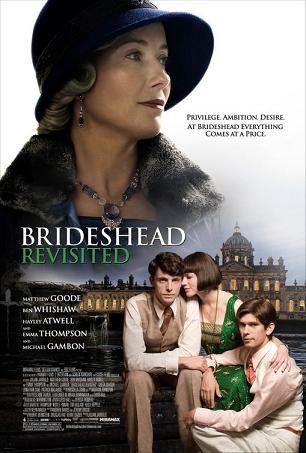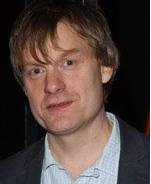
Main Page
Interviews Menu
Alphabetical Menu
Chronological Menu


Julian Jarrold directs Brideshead Revisited, romantic drama set during the early to mid 20th Century about Charles (Mathew Goode), a young man from a middle class background who moves into the Brideshead mansion of his friend, Sebastian (Ben Whishaw), who comes from an upper class family. Charles develops a romance with Julia (Hayley Atwell), Sebastian's sister, even though her rigid mother, Lady Marchmain (Emma Thompson) forbides her to marry a non-Catholic. Based on the novel by Evelyn Waugh. Julian Jarrold has previously directed Becoming Jane and, his directorial debut, Kinky Boots. I had the privilege to interview him. Miramax Films releases Brideshead Revisited on July 25th, 2008. NYC MOVIE GURU: What were your initial reactions to directing Brideshead Revisited? JJ: I was reluctant to come to this project because I associated with my parents in a rather boring, dull nostalgia for the aristocracy. Itís of no interest and resonance now. I realized that there are many interesting, contradictory themes in there. NYC MOVIE GURU: Whatís so challenging about directing period dramas? JJ: The costumes and the sets. Britain has changed. There are things that arenít right for the period. My designer was a wreck by the end of it. NYC MOVIE GURU: Why hasnít the novel Brideshead Revisited been turned into a theatrical film sooner? JJ: In the late 40ís, Evelyn Waugh flirted with Hollywood about making this script. He wrote these memos that made [filmmakers] impossible to make it. His demands were extraordinary for the script. One suspects that he didnít want a big Hollywood film. NYC MOVIE GURU: What was it like compressing the novel into a film? JJ: The book is a very difficult structure because Sebastian just disappears and heís the character that everyone remembers and loves about Brideshead. What we tried to do is to bring him back because the love triangle is interesting when itís with him, Julia [and Charles]. The potential for Brideshead is the sense of innocence and looking back on your life and realizing how you were and what youíve become, which I hope everyone can relate to. NYC MOVIE GURU: What was it like editing the film down to precisely 120 minutes? JJ: Very difficult. The first cut was quite long. You think at first that you canít cut it down. With clever juxtapositioning, cutting and the visual language of film, itís amazing how you can lose things and still understand the same. You read a script, itís absolutely perfect and you canít cut a thing, but after you film it, thereís certain beats that are obvious and you feel like youíre treading water. The directorís cut will be 2 1/2 hours. At first I thought, ďI canít cut anything. Itís ridiculous.Ē Now that I have, I feel very relaxed about it. NYC MOVIE GURU: How would those unfamiliar with the Catholicism of the time period react to Lady Marchmainís brand of Catholicism? JJ: I donít think that you really have to understand the nuances of that. Itís the power of the upbringing of these children and whether you can escape that. The parental ideology is, in this case, Lady Marchmainís brand of Catholicism. Itís not saying in any way saying that this is Catholicism; sheís using it to control. It can stand in for any religious ideology and people will get that. They certainly should get [the theme] of wanting to get away from your mother. NYC MOVIE GURU: How do you feel about the character of Lady Marchmain? JJ: She wants to do whatís right. She believes that thatís the best way to live your life. Itís not cynical or hypocritical. Her tragedy is that she does lose them. NYC MOVIE GURU: Why did you cast Emma Thompson as Lady Marchmaid? JJ: One of the reasons why we cast Emma Thompson for the part was because sheís able to bring a sort of humanity. Toward the end, you see pain and regret, which I hope is moving because you relate to her as a person and not just a villainess. NYC MOVIE GURU: How did you use cinematography and music to move the story along? JJ: We wanted to seduce the audience, be with Charles, and be bedazzled by this the Brideshead house. As the story darkens and you begin to see the dysfunctionality, I wanted to make it a more sinister, threatening place. For instance, the style of lightening changes into the second half. The first half is much freeróitís shot more by a handheld [camera]. I always saw the way I wanted to shoot it as fairly classic because it just seemed the correct way to do it. Iíve worked with the composer, Adrian Johnston, many times, so we know each other very well. We went through quite a process with it. We started off with two or three fantastic tracks which we didnít use in the end. They were enormous and fairly modern, but they over-dominating the audience. The ones that we included are much more subtle and hinting at the themes and the underlying tensions. NYC MOVIE GURU: Why didnít you expand on the homoeroticism theme found in the novel? JJ: It was always about Sebastianís journey. His conflict between what he wants to do and what heís prescribed to do. Itís that conflict that really explains his journey. Itís such a key part of him. In the book [the homoeroticism] is quite veiled and one didnít wanted to update something for the sake of it. NYC MOVIE GURU: What important lessons have you learned as a directing making his third feature film? JJ: You learn how to use the budget and stretch it out as far as you can. Also, never compromise on the casting. If you get one person wrong because thereís the pressure from the producer, it can just sink the whole thing, even though that at the face of it, it looks like the greatest idea. Iíll probably never do a period drama [again] because theyíre so difficult. Main Page Interviews Menu Alphabetical Menu Chronological Menu ______________________________________________________ |
The NYC Movie Guru
themovieguru101@yahoo.com
Privacy Policy